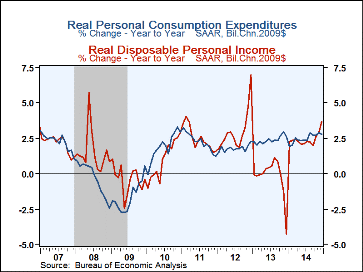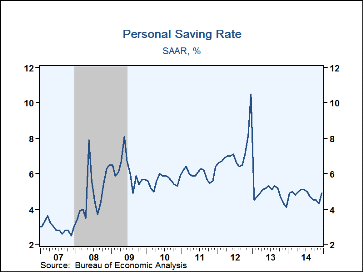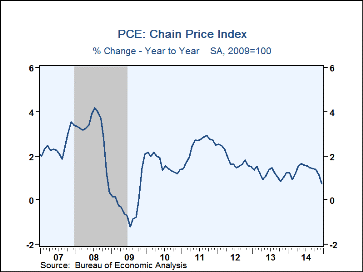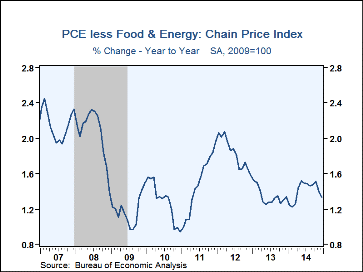 Global| Feb 02 2015
Global| Feb 02 2015U.S. Consumer Spending Logs Expected Decline; Savings Rate Firms
by:Tom Moeller
|in:Economy in Brief
Summary
Personal consumption expenditures declined 0.3% during December following little-revised readings of 0.5% and 0.3% during the prior two months. The figure matched expectations in the Action Economics Forecast Survey. For the full [...]
Personal consumption expenditures declined 0.3% during December following little-revised readings of 0.5% and 0.3% during the prior two months. The figure matched expectations in the Action Economics Forecast Survey. For the full year, spending rose 3.9%, its largest gain in three years. Lower prices provided an impetus for personal spending. The PCE chain price index fell 0.2% during each of the last two months following no change in October. As a result, the y/y change of 0.7% was the weakest since 2009.
Motor vehicles and parts purchases fell 2.0% last month (+12.0% y/y) in constant dollars but that followed a 4.9% November surge. Furnishings & appliance spending slipped 0.2% (+6.9% y/y) on the heels of a 1.3% jump. Recreational goods & vehicles purchases rose 0.2%, but by an outsized 12.0% y/y. Apparel purchases gained 0.5% last month (5.9% y/y) after a 3.2% jump. Real services purchases were unchanged (2.0% y/y) following two months of 0.3% increase, though spending on restaurants and hotels gained 0.9% (4.3% y/y) for the second month in the last three.
Despite all this spending, the personal savings rate suffered little deterioration last year. The full-year rate of 4.8% compared to 4.9% in 2013, and the December rate edged back to 4.9%. Personal saving rose 2.8% during the year.
Personal income rose an expected 0.3% during December (4.6% y/y) following a like gain in November. For all of last year, income rose 3.9%, roughly double the 2013 rise. Wages & salaries inched up 0.1% (4.8% y/y) but that followed a 0.6% rise. During all of last year, wages increased 4.3% after a 2.8% gain in 2013. Rental income gained 0.8% (7.6% y/y) pulling the full year rise to 7.5%. Proprietors income rose 0.9% (5.3% y/y) and dividend income gained 0.4% (8.0% y/y) with improved corporate profitability. Interest income slipped 0.2% and fell 1.0% y/y with lower interest rates. Personal transfer receipts increased 0.5% (5.6% y/y) rounding out a 4.4% rise during all of 2014, the strongest rise in four years.
The 0.2% decline in the chain price index reflected a 5.2% drop (-11.9% y/y) in energy prices while food prices rose 0.2% (3.0% y/y). Durable goods prices were off 0.5% (-2.8% y/y) and nondurable goods prices fell 1.2% (-1.6% y/y) with lower gasoline costs. Services prices ticked 0.1% higher (2.1% y/y). The price index excluding food & energy was flat m/m for the second straight month and up 1.3% y/y.
The personal income & consumption figures are available in Haver's USECON database with detail in the USNA database. The consensus expectation figures are in the AS1REPNA database.
| Personal Income & Outlays (%) | Dec | Nov | Oct | Y/Y | 2014 | 2013 | 2012 |
|---|---|---|---|---|---|---|---|
| Personal Income | 0.3 | 0.3 | 0.4 | 4.6 | 3.9 | 2.0 | 5.2 |
| Wages & Salaries | 0.1 | 0.6 | 0.3 | 4.8 | 4.3 | 2.8 | 4.5 |
| Disposable Personal Income | 0.3 | 0.3 | 0.4 | 4.5 | 3.8 | 1.0 | 4.9 |
| Personal Consumption Expenditures | -0.3 | 0.5 | 0.3 | 3.6 | 3.9 | 3.6 | 3.7 |
| Personal Saving Rate | 4.9 | 4.3 | 4.5 | 4.1 (Dec '13) |
4.8 | 4.9 | 7.2 |
| PCE Chain Price Index | -0.2 | -0.2 | 0.0 | 0.7 | 1.3 | 1.2 | 1.8 |
| Less Food & Energy | 0.0 | 0.0 | 0.2 | 1.3 | 1.4 | 1.3 | 1.8 |
| Real Disposable Income | 0.5 | 0.4 | 0.3 | 3.7 | 2.4 | -0.2 | 3.0 |
| Real Personal Consumption Expenditures | -0.1 | 0.7 | 0.3 | 2.8 | 2.5 | 2.4 | 1.8 |
Tom Moeller
AuthorMore in Author Profile »Prior to joining Haver Analytics in 2000, Mr. Moeller worked as the Economist at Chancellor Capital Management from 1985 to 1999. There, he developed comprehensive economic forecasts and interpreted economic data for equity and fixed income portfolio managers. Also at Chancellor, Mr. Moeller worked as an equity analyst and was responsible for researching and rating companies in the economically sensitive automobile and housing industries for investment in Chancellor’s equity portfolio. Prior to joining Chancellor, Mr. Moeller was an Economist at Citibank from 1979 to 1984. He also analyzed pricing behavior in the metals industry for the Council on Wage and Price Stability in Washington, D.C. In 1999, Mr. Moeller received the award for most accurate forecast from the Forecasters' Club of New York. From 1990 to 1992 he was President of the New York Association for Business Economists. Mr. Moeller earned an M.B.A. in Finance from Fordham University, where he graduated in 1987. He holds a Bachelor of Arts in Economics from George Washington University.
More Economy in Brief
 Global| Feb 05 2026
Global| Feb 05 2026Charts of the Week: Balanced Policy, Resilient Data and AI Narratives
by:Andrew Cates










